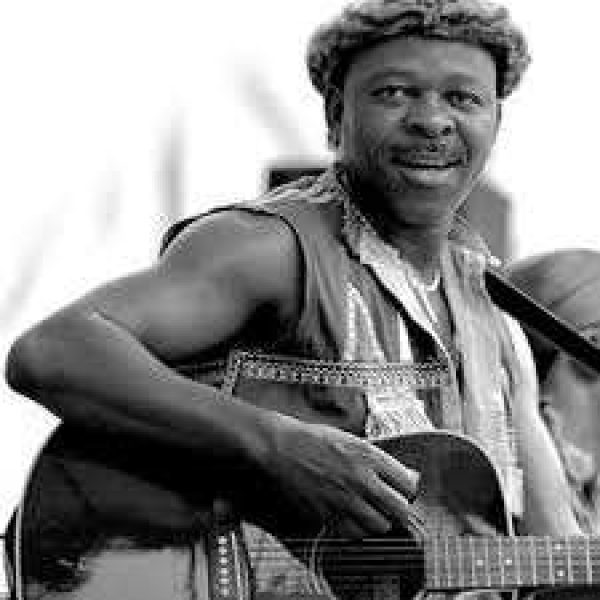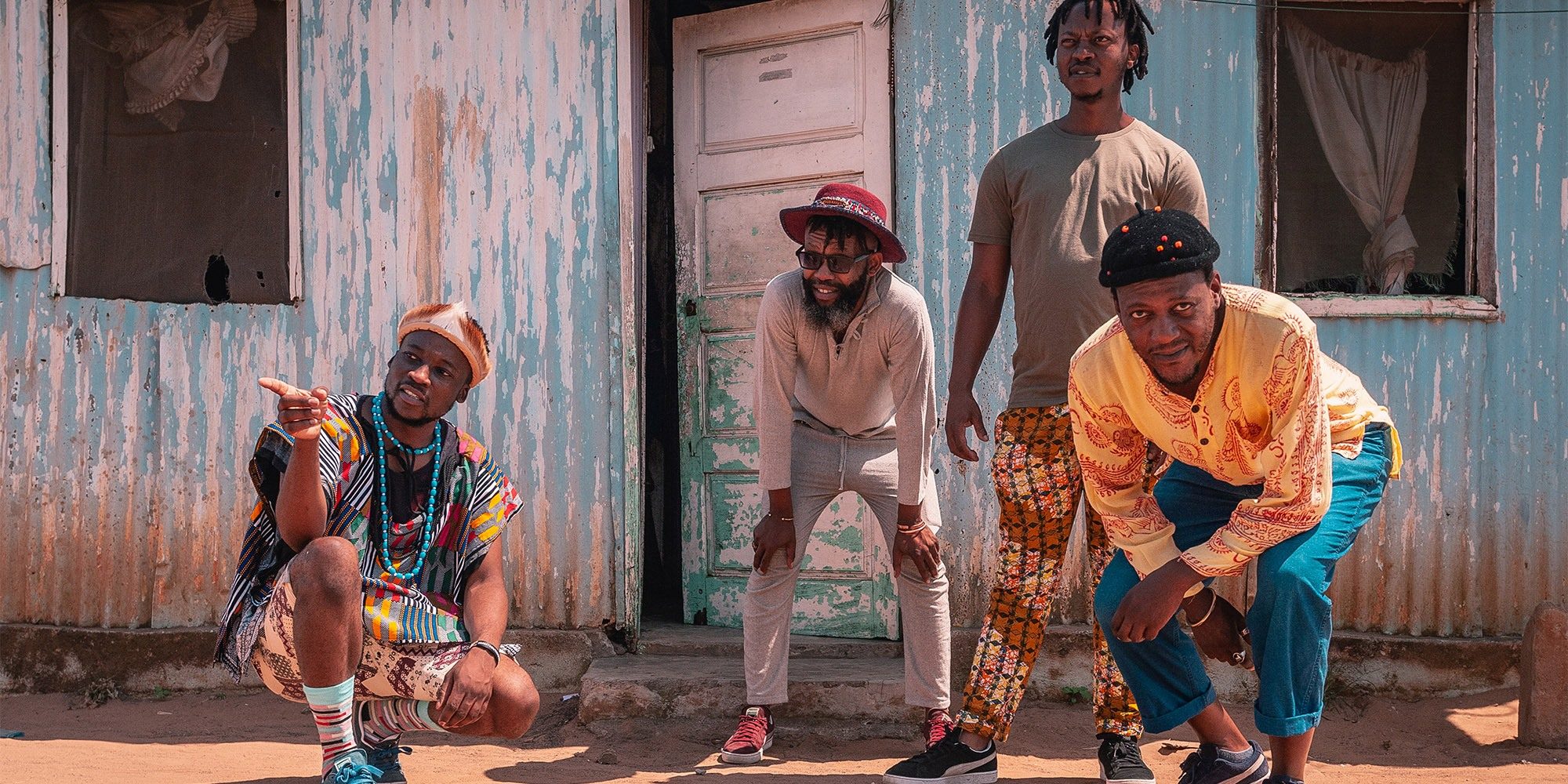The Soweto-based band Urban Village is a rare and wonderful thing in the South African music scene. It consists of four guys raised in the time of kwaito and Afro-house, but deeply drawn to much older styles—marabi, mbube, mbaqanga andmaskanda. From the start, they were determined to make music that embraces all of that and more. Their debut album Udondolo delivers on the idea. Its allegiance to the great music of South Africa’s past is evident on all 12 tracks, from the stomping beat and Mahlatini-esque groaning of “Dindi,” to the lulling lamellophone and soft Zulu harmonies of “Izivunguvungu,” and even a dash of straight up marabi jazz. But this is not mimicry. There’s a persistent hip-hop sensibility at work too, evident in the bending and blending of genres, always accomplished with confidence and fine musicianship.
We were intrigued by Udondolo, so Afropop’s Banning Eyre reached out to the band over Zoom and spoke with founder/guitarist Lerato and drummer Xolani (AKA Crush). Here’s their conversation.
Banning Eyre: So nice to meet you, Xolani. Our show has been covering South African music since the late 1980s, going back to the likes of Mahlathini and the Mahotella Queens. So it's a very interesting to find a young group now with such a broad palette of styles. That is unusual in today's South Africa. So I guess I'd like to start by hearing your story, and how you arrived at this sound.
Xolani: I think we are going to be joined by DJ Lerato. He is the person who actually started this band, the person who pulled it all together. We have been together for almost five years. So when he called us together, I think the most important thing we were trying to do was to actually create a sound through archiving—archiving our own sound. What was happening was that surprisingly, we were listening to a lot of Mahlathini and the Mahotella Queens. A lot. In fact, at one point we started wondering what happened to that type of music? It was very prevalent in the '80s and in the late ‘70s, and then all of a sudden in the 2000s, no one is playing that music.
So here we are, looking back. You know when you grow up in a certain area like Soweto, you always hear of the local heroes. So-and-so lived over here, and the other one lived over there. It might be specifically the Mahotella Queens. So it was always a question that if they lived in this area and were able to contribute such a sound, what happened to that sound?
For example, there's a song called “Dindi” where we were specifically saying,
Let's look back. Let’s bring this music back into the world of today.” Jazz today is still being celebrated, and jazz has been here a long time. We can always argue about where it's from. Jazz is a very big American influence. But what happened to that influence when it was not just something from outside these borders? What would it have sounded like? That's what we were trying to do in all the music that we were trying to hook up.
From the first song we learned, we were always trying to say, "How would the guitar have sounded? How would the drums have sounded? How would the bass have sounded?" And we were always trying to look and archive the parts and say let's bring it to the current time, and give our own identity to the music.
You are the drummer, and Tubatsi is the main vocalist. But it sounds like you all sing, because there's a lot of harmony.
I'll tell you what. Tubatsi is the vocalist. All those things that are happening on “Dindi,” it’s him. On stage, we all sing. But for this specific one, he actually asked to lay all the vocals down himself.
He certainly captured the essence of the groaner sound, and really that whole era, but you've also added elements to bring it into the present. You are updating the tradition.
Definitely. If we keep the music too much in the past, it becomes stuck in that era. We have not moved the music. If you look at any form of music, any genre, it transforms. Whether it's hip-hop or any kind of world music, it transforms. Everything we listen to today is something that existed in another era of time, and people moved it along. Let's not be stuck in the past or the present. Let's also take a bit of the future, so we moved the music.
I get that. It's tricky when you want to keep the essence of something, what makes it special, but you also want to move ahead, as you say. You have to find the right balance, that sweet spot. And I think you guys do a great job of that. You even have a marabi song, music going back to the 1930s, and a lot of those gospel-like vocals that reminded me of groups like Ladysmith Black Mambazo.
Yes, and all those elements, we said we have to have them. We have to include those elements so they also give us an identity. I think our biggest driver is the idea of identity. We all kind of grew up with the same influences, we all grew up in the same area, just to walk away from each other, all four of us.
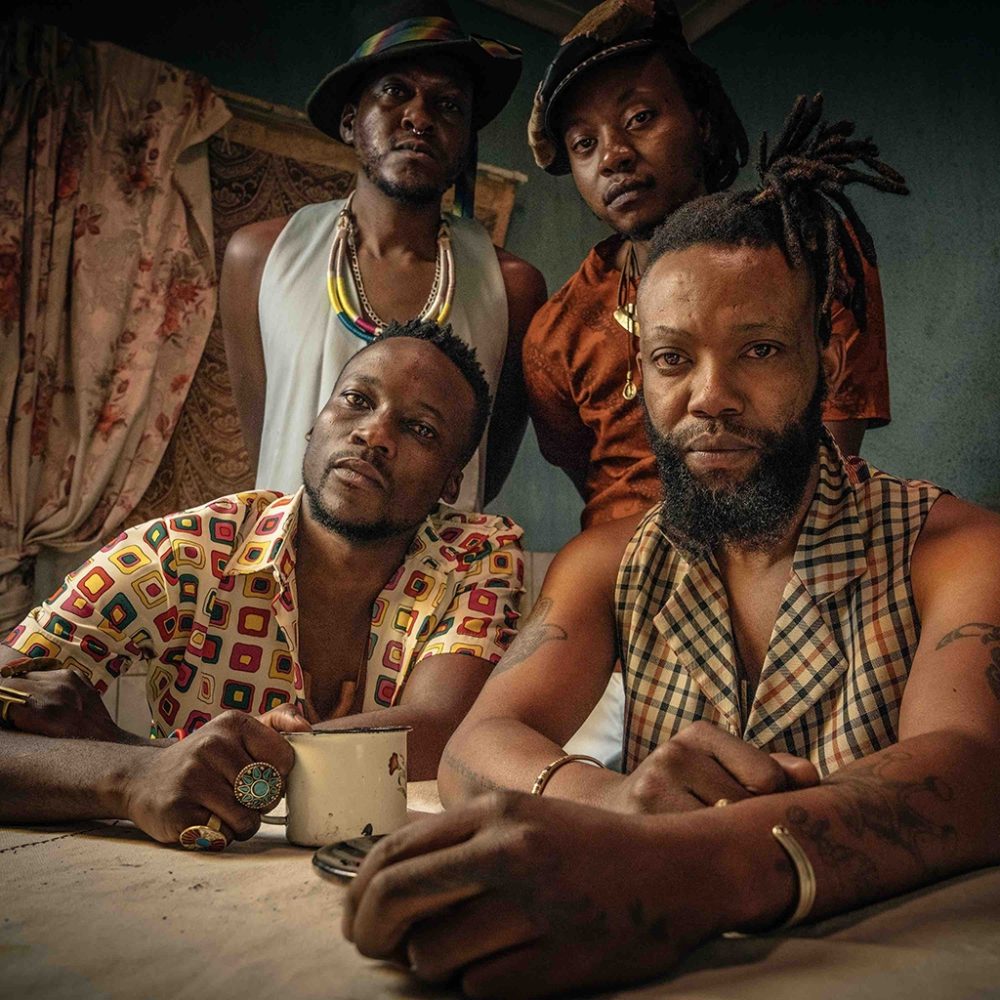
In Soweto. Were you friends from way back? Or did you only come together later on?
Me and Lerato were childhood friends, from our early teens, playing with bikes and TV games. We were already friends before we were musicians. I was also in an ensemble with Lerato, way back, when we first started being musicians. So it was funny how we always grew up with the same lives, playing TV games, and then as we grew, he became a DJ. He was playing house music, and I would always go to the venue, helping him carry heavy vinyl bags. We would always go to events together. Then, surprisingly, Simangaliso [the bass player] was also a house DJ. Me and Simanga went to the same primary school, so I knew him from there.
So here we are, in the house days when they were both DJs, and we would meet up with each other. None of us had picked up an instrument yet. But we were, "Hey, I went to primary school with you, and now we meet up." Then we split again, but later, we met again when I was playing guitar and drums. And that's how we formed our first band Skin to Soul. That was our first ensemble.
Fast forward into the future, Lerato and Tubatsi were also childhood friends. They actually met in what we call a recreational center, where there was a lot of dance and music. Lerato played guitar in that hall, and that's how he met up again with Tubatsi. That's the weird way it happened. Tubatsi and his uncle met up with me and said, "We like the way you play. We'd like you to come and do a certain event with us." So we went and played at Lerato’s wife's cousin's wedding, and I said to Tubatsi, “Man, the way you sing is so amazing. I want to be in a band with you." But we left it at that.
Then when Lerato and Tubatsi decided to form a band together, I also joined. Simanga was the last to join us, because at first we were very much an acoustic band. But when he joined us, we became the formidable four that you know today. We became a quartet.
It's almost like it was fate that you guys were going to end up together. That's nice. So the band started five years ago. Have you made other albums before this one?
Not at all. Not as Urban Village. This is our first album. Initially we made an EP. But it was not publicized much. The EP had some of the songs from our album, like “Ubaba,” “Makolo Yanga” and “Inkani.” Those were all part of that EP, and there was another song that didn't make it into the album. That EP was basically the people saying, "Guys, we love the music. We hear you guys on stage all the time. Please record something for us so that we can take you guys home." So that's how the EP came across, and it was called Bantu Arts.
Your album really jumped out to us, because it is so unlike other music coming out of South Africa these days. I remember having conversations with Johnny Clegg, before he passed, and also Tabang Thabane, where they were saying that the attitude of the public was not very interested in music with traditional old-school elements like marabi or mbaqanga. They seemed to be saying that it was more than just being out of fashion. There was real resistance. What's been your experience with that? How do you fit into this new cultural landscape?
Now Lerato has joined us. He was traveling to a place where he could connect with WhatsApp. But I know exactly what you're asking. It is actually twofold. With the industry and lots of the pop-culture, and it's not just pop music, it's the culture that boxes this kind of music out. I concur with what Johnny Clegg is saying and what Tabang is saying. Tabang Is our peer, and we meet up together at events.
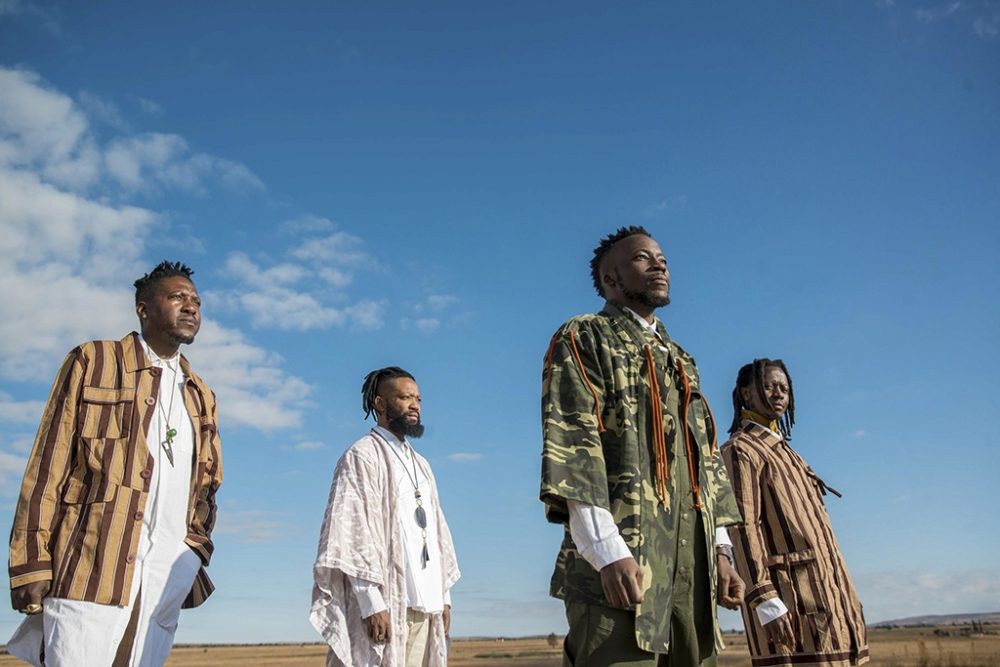
Lerato, good to see you. We’ve been talking about the history of the band, and now about the difficult environment you are working in, where the industry is not at all open to tradition-based music. What's your take on that?
Lerato: It's quite difficult, because we grew up looking for that stream to be our main focus for growth musically in South Africa. And yet it is not given any platform, or any consideration. So it becomes a difficult position being native musicians still surviving here in South Africa, but we still can't express our inherited music. So therefore, we look for opportunities outside of South Africa most of the time. And that also becomes unfair to the motherland at the end of the day.
How do you experience that kind of resistance? Is it hard to get radio play? Or interviews? Do they just ignore you, or is it actually hostile?
Lerato: We try to find ways to go around it by hosting our own events and getting booked in festivals that are fond of our music, and are interested in what we do. But it's quite a tricky one to go around the industry, especially in this time and age, because there's a lot of dance music and pop and disco music being pumped on our radio stations. They don't give enough room for our cultural music, or alternative music to get an opportunity to spread the word. Radio was a powerful tool in the ’70s and ‘80s.
Xolani: I agree. Specifically, if we’re talking about mainstream media, that avenue becomes boxed out for us. They only celebrate that kind of pop culture and dance music, as you say. So when we arrived, it actually seemed like we were in an underground scene. And for a long time it felt like every time we create a platform for ourselves, wherever we are, whether it's in backyards or parties we get invited to, it looks and feels like an underground scene, where even the culture is very different: the way people are dressed in the way they present themselves is very different from what you see in what we could call pop culture.
Who is your audience in South Africa?
Lerato: Our audience is quite open. What I would pin point is that our audience is the working class who wants to connect more with their roots, or who are trying to find themselves in this whole spiritual world. That would be our main audience, but otherwise, our audience is quite open from kids who are eight years old to old people who are 80 years old.
Xolani: Our audience becomes very tricky in South Africa. They are more from the 45 to 60-year-olds. That's the main age bracket. But there are also people, our peers, from the working class, people who became very much tired of the popular culture. So their ears were tired of hearing the same form of house beats and these forms of dance music. So when they look for something alternative, they actually come to our kind of group, outside the mainstream market.
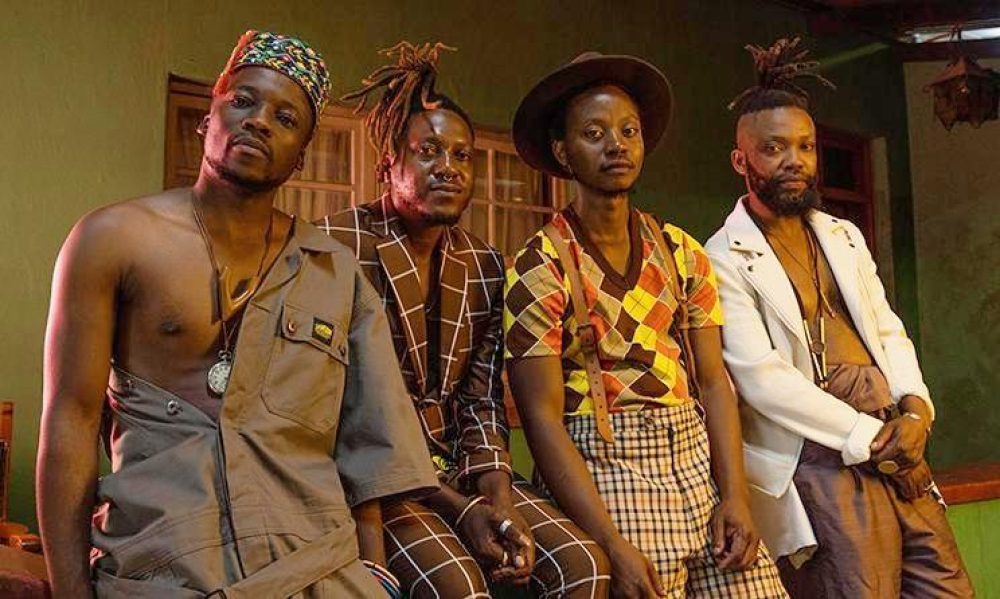
I'm interested in what you say about people who are trying to find themselves in the spiritual world. Let's talk about some of the songs and how you kind of address that. Other songs you would particularly point to any album that address that search for identity?
Xolani: “Dindi” speaks about that thing, about your own part of yourself. Dindi is a colloquial term for all dark skinned people. As we said earlier on, we had to take from the old music, the Mahlatini sound, but the content became about celebrating your own skin. We’re singing to a world where there is skin-bleaching, where people are self-hating, and also what we call xenophobia, which is in itself Afrophobia. Because you are fighting against people with the same skin tone as you. So for me, “Dindi” is one of those songs.
Lerato: Also a song like “Sakihsizwe.”
That's a beautiful song, another one with those gospel harmonies.
Yeah. And it talks about being a nation. Because even us as the Urban Village music band, we are not predominantly a Christian band or a Buddhist band. Through our musical combination, we are able to evoke a certain mutual, spiritual level where people no matter what race or background they come from can be able to connect. So we are able to grasp some of the people who are still looking for that spiritual path or trying to figure themselves out in that light. That's part of the curation and creation of our music as a group, how we write, how we convey the message out there. “Sakihsizwe” means “building a nation.”
Tell me about the song, “Izivunguvungu.” I hear the mbira in the mix there, along with some very beautiful harmonized vocals.
Xolani: “Izivunguvungu” is about the storms of life, the tempests of life. The word means storm, like a tornado. So this is the storms of life. In that song we use mbira, which is an instrument we have in the area near Zimbabwe and Mozambique. We got that one when we traveled to Mozambique, and then we had to include it as a kind of archiving as well. It's not just the music. It's also the musical instruments that we want to introduce in the form of the identity of the sound itself. So the song speaks about a man who wants to come to his own mother, but he says, "I would love to come and be with you, but there are storms of life that are always impediments for me to get to you." That song also brings back the style of vocal harmonies that you hear in Ladysmith Black Mambazo.
It's a beautiful song. You know I spent time in Zimbabwe with mbira players and learning to play some of that music on guitar. So that one really struck me. What about the song “Ubusuku”? Xolani, on that one, your drumming reminds me of Afrobeat, the style of Tony Allen.
That's right. On that one and “Sakihsizwe,” the influence is from Afrobeat. We are always looking back on a legend like Tony Allen. “Ubusuku” means "the night." It’s about a man who goes to consult with his local sangoma. In English you might call that a witch doctor. It's a local healer. And what was said to him is that he must go on a journey, on a path, and that journey has to happen in the night. That's where the song actually begins. But what the sangoma is speaking about is the spiritual journey that this man has to take. And that's also what Urban Village is about, a spiritual journey.
One of the first songs we made, which is not on the album, was called "My Calling.” Within all of us there is actually a thing about a calling to a spiritual journey. In his journey, he talks about the things that he sees, and the sounds that he hears, and the animals that he discovered in the night. Most sangomas, when they go out into the wilderness, there are things they meet there, and they speak about that a lot.
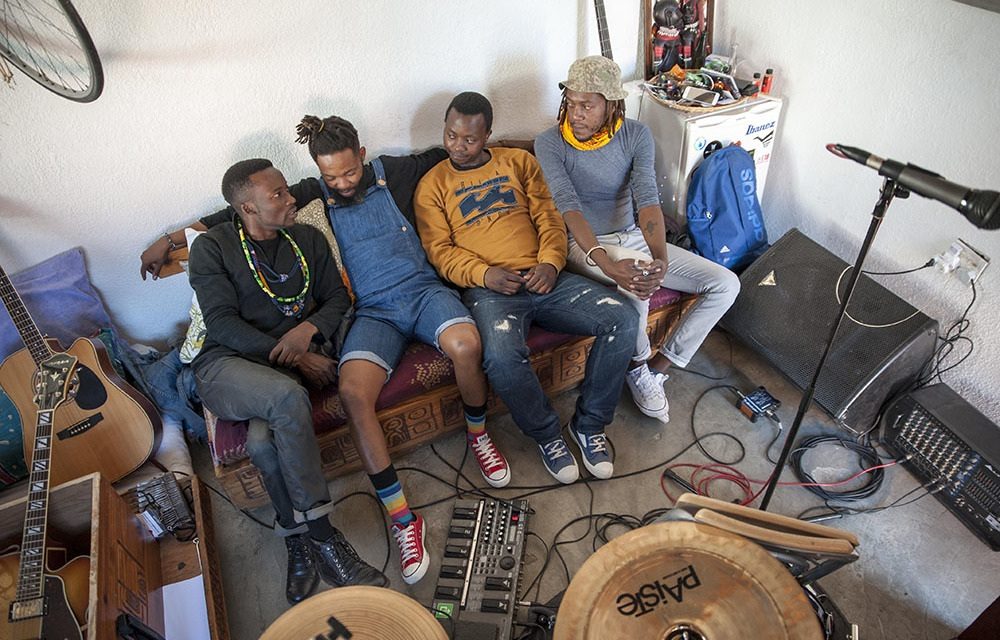
Let me ask you about one more song. “Empty K-Set” has a very original sound. There's a lot going on in that one. There's a more contemporary hip-hop vibe.
Lerato: Yes, “Empty K-Set” is paying tribute to our youth culture when we were growing up. The way we were mainly introduced to music in that era was through cassettes. In the city of Johannesburg, they used to be a guy selling empty cassettes on Samora Street. He would say, "Empty, empty, empty cassette! Two for five rands. Empty, empty." So we were remembering that era and saying how important that was for us, being introduced to music through the cassette. And also, we used to buy empty cassettes, because you could go home and record them, put on your own music.
I lived in that era too. I relate. So in the time we have left, what are your plans? What are you looking to do in the year to come?
Lerato: We have started working on our second album, but so far we have been challenged by time, because COVID hasn't made things easy for us. We are just caught up between the time of it being released and it being properly prepared. But we are planning on a second offering for the villagers. We're planning on expanding more to the world and reaching out, creating more villagers and small villages around the world.
Xolani: What we experienced with our first album is it never got to tour. It never got that lift. We still believe in the old form of the music where that album tours with the band itself, not just being online. So probably at this stage we will tour with the second album. With the first album it will feel redundant, because every time we were about to tour, there was a certain banning or lockdown. But with the second album, we want to bring it to the villagers.
We look forward to that. Keep us posted because we want to help you guys get known. We love what you're doing. You guys are young. Things will change, and you'll be back out on the road.
Most definitely. We will stay in touch.
Related Audio Programs
